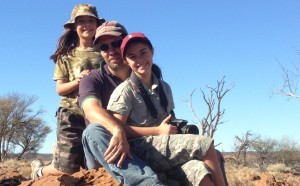In Broken Hill, church planters Matt and Kylie Letcher can feel a thousand miles away from the sort of support the average Australian ministry couple might take for granted.
It makes them all the more thankful for the Geneva Push assessment process they went through long before their car stirred up its first cloud of red dust.
“It was really holistic,” says Kylie. “It covered so many things that Australian church planters have to prepare for, and it forced Matt and I to really reflect on what it was we were planning to do.”

Matt Letcher and his daughters (Natalie & Katie) at Broken Hill.
‘Assessment’ has become the buzz word for would-be church planters with American studies demonstrating that ministries that have a rigorous, independent evaluation before they begin, stand a much higher likelihood of surviving the first three years. But many of the processes currently offered to Australian planters are simply clones of American tools.
Hoping to better serve couples like the Letchers, Geneva Push has commissioned Lifeway Research’s internationally respected missiologist Dr Ed Stetzer to create the first truly Australian assessment tool.
“A church plant needs more than a good leader, it needs a good plan,” says Dr Stetzer. “This research seeks to provide church planting organisations in Australia with a tool that provides a solid initial indicator of a potential planter’s readiness for church planting and their probability of success.”
Dr Stetzer says Australian denominations and independent church planters cannot afford to rely on American programs and hope they will do the job.
“Australians are not just Americans living in Oz,” he says. “When you have a significant shift in context you have to validate that the tools are actually measuring things that matter in your new culture.”
Geneva Push general manager Scott Sanders oversees Australia’s largest, non-denominational church planting network. He regularly flies across Australia to meet potential church planters.
Having assessed 85 potential planters over the past three years, he says he can understand why putting people through the right assessment process is so important.
“It’s a lot of work for them. It’s also the tension between wanting to plant and not wanting to be told ‘this might not be for you’ or ‘wait a while’,” says Sanders. “We’re looking hard at their character, their plans, their knowledge and spiritual gifts—we care about planters and their families—so we want to make sure they’re getting the best assessment available.”
Which explains why Sanders is so keen to get his hands on the Australia-specific assessment tool, along with a list of prominent denominations that are co-funding the research.
“Crossover Australia (Baptist Churches), Fellowship of Independent Evangelical Churches, Evangelism and New Churches (Sydney Anglicans), the Vineyard Churches and the ASAP Committee of NSW Presbyterians are all investing in the study,” Sanders reports.
In Broken Hill, Matt Letcher says he’s glad to see Australian church planting growing in maturity.
When he and his wife decided to take on Saltbush Evangelical Church they were glad they’d been asked to think through issues they had not thought about themselves. “We really benefited from Geneva’s help, and we’d encourage people to persist with an assessment,” Matt says. “It can feel like a huge amount of work but articulating the things you have to do really forces you to reflect on your plans, and highlight issues before they become a problem.”
Lifeway Research’s initial findings on the marks of Australian church planting success and failure will be released at Geneva Push’s annual national conference in December this year.
Geneva Push and its partners hope to be using the new Australian church planting assessment tool next year.
Email This Story
Why not send this to a friend?
